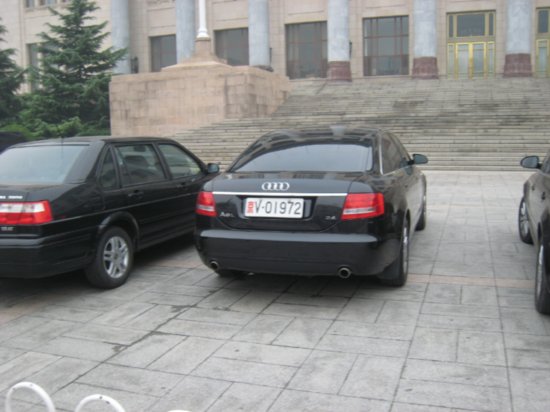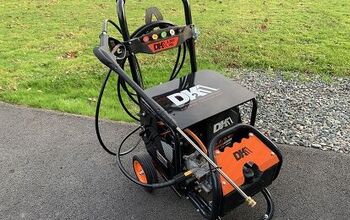Chinese Government Urged To Buy Chinese. At Least A Bit More

If you are stuck in Beijing traffic, while police closes the center lane to give preferential treatment to a government motorcade, you will notice a penchant for foreign brands amongst Chinese government officials: White license plates (= government) are usually found on bigger bore Audis, BMWs, and Mercedeses (or “Benz” as they are called in China.) After all, they are made in China in joint ventures, and only petty people will point out that an Audi A8, a Volkswagen Touareg, or a Benz S Class are imports.
The tastes are about to change, albeit not too drastically.
Not only are government officials being asked to buy Chinese. They are also urged not to splurge.
Under the proposed regulation, ordinary vehicles of all government departments nationwide should have an engine displacement of up to 1.8 liters and cost less than $23,500.
Ministers and provincial heads should make do with an engine displacement of up to 3.0 liters and a price below $66,000.
Domestic car manufactures welcomed the new regulations, saying they will be given a boost by the change. We’ll keep an eye on Beijing’s center lanes to monitor whether the new regulations will make a difference. Others are watching as well. So far, China’s Procurement Center of the Central People’s Government (PCCG) has deemed 721 vehicles as excessive or extravagant. A drop in the bucket, we’d say.

Bertel Schmitt comes back to journalism after taking a 35 year break in advertising and marketing. He ran and owned advertising agencies in Duesseldorf, Germany, and New York City. Volkswagen A.G. was Bertel's most important corporate account. Schmitt's advertising and marketing career touched many corners of the industry with a special focus on automotive products and services. Since 2004, he lives in Japan and China with his wife <a href="http://www.tomokoandbertel.com"> Tomoko </a>. Bertel Schmitt is a founding board member of the <a href="http://www.offshoresuperseries.com"> Offshore Super Series </a>, an American offshore powerboat racing organization. He is co-owner of the racing team Typhoon.
More by Bertel Schmitt
Latest Car Reviews
Read moreLatest Product Reviews
Read moreRecent Comments
- Theflyersfan If this saves (or delays) an expensive carbon brushing off of the valves down the road, I'll take a case. I understand that can be a very expensive bit of scheduled maintenance.
- Zipper69 A Mini should have 2 doors and 4 cylinders and tires the size of dinner plates.All else is puffery.
- Theflyersfan Just in time for the weekend!!! Usual suspects A: All EVs are evil golf carts, spewing nothing but virtue signaling about saving the earth, all the while hacking the limbs off of small kids in Africa, money losing pits of despair that no buyer would ever need and anyone that buys one is a raging moron with no brains and the automakers who make them want to go bankrupt.(Source: all of the comments on every EV article here posted over the years)Usual suspects B: All EVs are powered by unicorns and lollypops with no pollution, drive like dreams, all drivers don't mind stopping for hours on end, eating trays of fast food at every rest stop waiting for charges, save the world by using no gas and batteries are friendly to everyone, bugs included. Everyone should torch their ICE cars now and buy a Tesla or Bolt post haste.(Source: all of the comments on every EV article here posted over the years)Or those in the middle: Maybe one of these days, when the charging infrastructure is better, or there are more options that don't cost as much, one will be considered as part of a rational decision based on driving needs, purchasing costs environmental impact, total cost of ownership, and ease of charging.(Source: many on this site who don't jump on TTAC the split second an EV article appears and lives to trash everyone who is a fan of EVs.)
- The Oracle Some commenters have since passed away when this series got started.
- The Oracle Honda is generally conservative yet persistent, this will work in one form or fashion.


































Comments
Join the conversation
I'm too lazy to look it up myself: Where is China on pollution control? Isn't their dirty car exhaust their biggest health threat?
drivebywire: Interesting point. Whether Volvo will count as a "domestic brand" remains to be seen. Volvo will be owned by the Hong Kong holding company of Geely. Technically, Hong Kong is regarded as "overseas" - Chinese nationals need a visa to get into HK, and a lot of the "foreign investment" into China flows via Hong Kong. If Volvo counts as "domestic," then a privately owned car company (Geely) could sell cars unencumbered to the government, whereas government-owned companies engaged in joint ventures (such as SAIC, FAW, Brilliance, BAIC) would be restricted by the new regulations. We'll see how that works out.
Tosh: Big cities such as Beijing and Shanghai have enacted tough regimens. Can't enter with anything less than Euro 4, which is quite good. Stinkers are being euthanized en masse. The air quality drastically improved last year. As mentioned by psmisc, cars are now a small contributor.